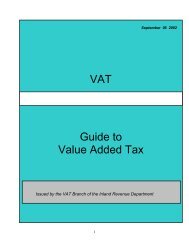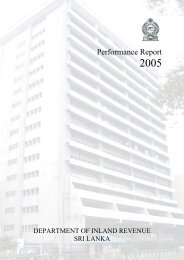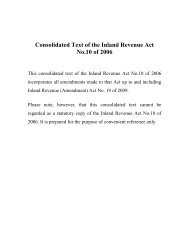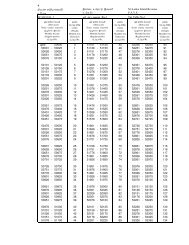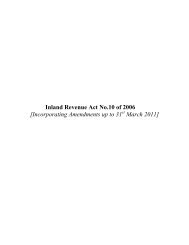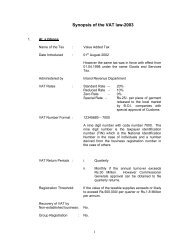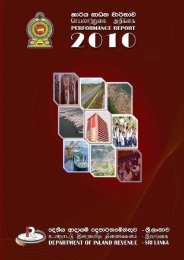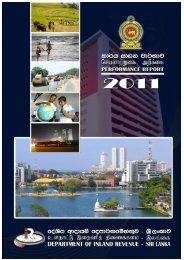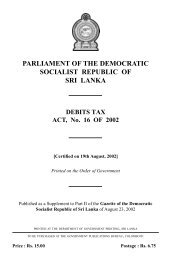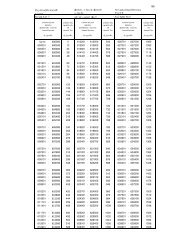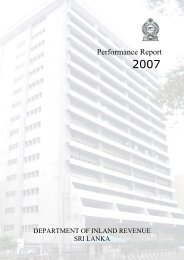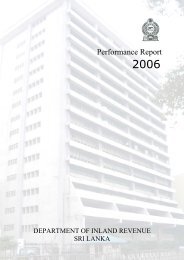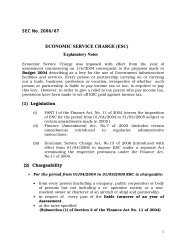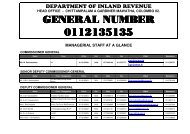Inland Revenue (Amendment) Act No. 9 of 2008 Explanatory Notes ...
Inland Revenue (Amendment) Act No. 9 of 2008 Explanatory Notes ...
Inland Revenue (Amendment) Act No. 9 of 2008 Explanatory Notes ...
Create successful ePaper yourself
Turn your PDF publications into a flip-book with our unique Google optimized e-Paper software.
<strong>Inland</strong> <strong>Revenue</strong> (<strong>Amendment</strong>) <strong>Act</strong> <strong>No</strong>. 9 <strong>of</strong> <strong>2008</strong><br />
<strong>Explanatory</strong> <strong>No</strong>tes and Instructions<br />
1. Exemptions / Concessions<br />
1.1 Institutions<br />
(<strong>Amendment</strong>s made to section 7 <strong>of</strong> the principal enactment)<br />
- Co-operative Societies ( sections 7(b)(xvii) and 7(h) <strong>of</strong> the Principal<br />
enactment)<br />
The pr<strong>of</strong>its and income from all the sources <strong>of</strong> registered co-operative societies<br />
(including co-operative rural banks) within the meaning <strong>of</strong> the Co-operative<br />
Societies Law <strong>No</strong>. 5 <strong>of</strong> 1972 are exempt from income tax for the five years <strong>of</strong><br />
assessment falling within the period 01.04.<strong>2008</strong> - 31.03.2013.<br />
- Clause 2 (3) <strong>of</strong> the <strong>Amendment</strong> <strong>Act</strong><br />
The sub- paragraph (xvii) <strong>of</strong> paragraph (b) <strong>of</strong> section 7 which provided for a<br />
specific exemption to co-operative societies on any business specified by the<br />
Minister by notice published in the Gazette is kept closed for the above period <strong>of</strong><br />
five years. This provision will re-activate effective from April 1, 2013.<br />
- Clause 2(1) <strong>of</strong> the <strong>Amendment</strong> <strong>Act</strong><br />
- Api Wenuwen Api Fund ( section 7 (i) <strong>of</strong> the principal enactment)<br />
The pr<strong>of</strong>its and income from all sources <strong>of</strong> “Api Wenuwen Api” Fund<br />
established by the Api Wenuwen Api Fund <strong>Act</strong> <strong>No</strong>. 6 <strong>of</strong> <strong>2008</strong> are exempt<br />
from income tax with effect from April 1, <strong>2008</strong>.<br />
- Clause 2 (3) <strong>of</strong> the <strong>Amendment</strong> <strong>Act</strong><br />
The exemptions referred to above are extended to cover the withholding tax on<br />
interest on money deposited by such co-operative societies or Api Wenuwen Api<br />
Fund. [The paragraph (a) <strong>of</strong> subsection (3) <strong>of</strong> section 133 <strong>of</strong> the principal<br />
enactment is amended by the insertion <strong>of</strong> sub -paragraphs (iv) and (v) to provide<br />
for such exemption on withholding tax].<br />
- Clause 41(1) <strong>of</strong> the <strong>Amendment</strong> <strong>Act</strong><br />
1.2 Employment income<br />
(<strong>Amendment</strong> to section 8 <strong>of</strong> the principal enactment)<br />
1
- Employment income <strong>of</strong> <strong>No</strong>n – citizen experts { <strong>Amendment</strong> to<br />
paragraph (d) <strong>of</strong> section 8}<br />
(i) The present exemption applicable on employment income from Sri Lanka<br />
<strong>of</strong> experts who were brought to Sri Lanka by BOI undertakings which are<br />
exempt from income tax under an agreement entered into with BOI prior<br />
to December 31, 1994 during the period <strong>of</strong> such exemption, is closed with<br />
effect from April 1, <strong>2008</strong>. (However, this amendment has been reverted<br />
by the subsequent amendment and the exemption is remained unchanged<br />
as if an amendment was not made).<br />
- Clause 3(1) (b) <strong>of</strong> the <strong>Amendment</strong> <strong>Act</strong><br />
(ii) A new exemption is introduced with effect from April 1, <strong>2008</strong> in respect<br />
<strong>of</strong> emolument arising in Sri Lanka <strong>of</strong> non citizen experts. {Insertion <strong>of</strong><br />
paragraph (dd) <strong>of</strong> subsection (1) <strong>of</strong> section 8}.<br />
The emoluments arising in Sri Lanka and any income not arising in Sri<br />
Lanka <strong>of</strong> any non citizen individual who is an “expert” is employed in Sri<br />
Lanka;<br />
- by any undertaking entered into agreement with the Government, being<br />
an agreement which provides for exemption <strong>of</strong> such emoluments ; or<br />
- by any strategic development project gazetted by BOI under Strategic<br />
Development Projects <strong>Act</strong> <strong>No</strong> 14 <strong>of</strong> <strong>2008</strong>.<br />
Up to now there are no any approval granted for strategic development<br />
projects. Therefore, this provision is applicable only to “experts” work for<br />
undertakings entered into agreements with the Government, being agreements<br />
in which the agreement <strong>of</strong> the Government to exempt such experts is included.<br />
For the purpose <strong>of</strong> this exemption, the expert has been defined to mean an<br />
individual who has expertise in such field as may be determined by the<br />
Commissioner General, as being a field in which sufficient expertise is not<br />
available among the citizens <strong>of</strong> Sri Lanka. The approval <strong>of</strong> the Commissioner<br />
General, to treat an individual as an expert, is a requirement for the<br />
exemption.<br />
- Clause 3(1) (c) <strong>of</strong> the <strong>Amendment</strong> <strong>Act</strong><br />
- Employment income <strong>of</strong> employees <strong>of</strong> Government institutions.<br />
The exemption <strong>of</strong> one half <strong>of</strong> the <strong>of</strong>ficial emoluments <strong>of</strong> employees <strong>of</strong><br />
Government institutions [referred to in paragraph (b) <strong>of</strong> subsection (1) <strong>of</strong><br />
section 8] is restricted to operate only up to 31.03.<strong>2008</strong>. A relief on the<br />
<strong>of</strong>ficial emoluments has been provided through a tax credit mechanism. This<br />
is explained later in item 6.<br />
- Clause 3(1) (a) <strong>of</strong> the <strong>Amendment</strong> <strong>Act</strong><br />
2
- Grant <strong>of</strong> shares or share options to employees by the employer<br />
The requirement for the scheme under which shares or share options are<br />
<strong>of</strong>fered to employees, to be uniformly applicable to all employees <strong>of</strong> an<br />
employer to qualify for exemption, is revised replacing it with the requirement<br />
for the scheme to be a reasonable one. The amendment is made to paragraph<br />
(p) <strong>of</strong> subsection (1) <strong>of</strong> section 8.<br />
The reasonability is decided based on the specific criteria (based on a set<br />
<strong>of</strong> guidelines). The concurrence <strong>of</strong> the Commissioner General should be<br />
obtained by the respective employer for the scheme that it is reasonable in<br />
his opinion. If so, the benefit is exempt.<br />
Any other circumstances (i.e. where the scheme is not reasonable) the<br />
liability arises at the time <strong>of</strong> the allotment or vesting <strong>of</strong> shares to the<br />
respective employee. Before granting exemption, verify from the<br />
Secretariat whether the Scheme is reasonable in the opinion <strong>of</strong> the CGIR.<br />
- Clause 3(1) (e) <strong>of</strong> the <strong>Amendment</strong> <strong>Act</strong><br />
1.3 Exemption <strong>of</strong> certain Interest income<br />
(<strong>Amendment</strong> to section 9 <strong>of</strong> the principal enactment)<br />
(i)<br />
The current exemption <strong>of</strong> senior citizens on interest up to Rs.<br />
200,000/- from deposits in State Banks is extended also to interest<br />
from deposits in Co- operative Societies within the meaning <strong>of</strong> the<br />
Co operative Societies Law <strong>No</strong> 5 <strong>of</strong> 1972. (Section 9(h) is amended).<br />
- Clause 4 (1) <strong>of</strong> the <strong>Amendment</strong> <strong>Act</strong><br />
(ii) The interest or discount arising or accruing to any non-resident<br />
citizen <strong>of</strong> Sri Lanka, who invests in Motherland Development<br />
Bonds denominated in foreign currency and issued by or on behalf<br />
<strong>of</strong> the Government <strong>of</strong> Sri Lanka is exempt from income tax. Section<br />
9 (l) is inserted to the principal enactment.<br />
- Clause 4 (3) <strong>of</strong> the <strong>Amendment</strong> <strong>Act</strong><br />
(iii) The interest accruing or arising on or after April 1, <strong>2008</strong> , from any<br />
investment made outside Sri Lanka to any person resident in Sri<br />
Lanka , if such interest is remitted to Sri Lanka through a bank.<br />
Section 9 (m) is inserted to the principal enactment.<br />
- Clause 4 (3) <strong>of</strong> the <strong>Amendment</strong> <strong>Act</strong><br />
1.4 Exemption <strong>of</strong> certain Dividend income<br />
(<strong>Amendment</strong> to section 10 <strong>of</strong> the principal enactment)<br />
3
Any dividend paid on or after April 1, <strong>2008</strong>, by a company not resident in<br />
Sri Lanka to any shareholder resident in Sri Lanka is exempt from income<br />
tax, if such dividend is remitted to Sri Lanka through a bank. Section 10<br />
(j) is inserted to the principal enactment.<br />
- Clause 5 <strong>of</strong> the <strong>Amendment</strong> <strong>Act</strong><br />
1.5 Exemption on income accruing to the owner <strong>of</strong> certain low<br />
cost houses constructed (<strong>Amendment</strong>s to section 11 <strong>of</strong> the<br />
principal enactment)<br />
The present exemption on income accruing to the owner <strong>of</strong> any house<br />
constructed, (rent or the Net Annual Value) is restricted to such houses,<br />
the construction <strong>of</strong> which is completed prior to April 1, <strong>2008</strong>.<br />
Accordingly,<br />
(i)<br />
if the construction is completed prior to April 1, <strong>2008</strong> , the<br />
income from rent or net annual value, as the case may be, from that<br />
house is exempt from tax for the year <strong>of</strong> assessment in which the<br />
construction is completed and 4 subsequent years <strong>of</strong> assessment ,if<br />
such house is used solely for residential purposes.<br />
This exemption is extended to further two years <strong>of</strong> assessments, if<br />
the floor area <strong>of</strong> that house is one thousand five hundred square feet<br />
or less,<br />
(i.e. the year <strong>of</strong> completion <strong>of</strong> the construction, and 6 years <strong>of</strong><br />
assessments immediately succeeding that year <strong>of</strong> assessment. )<br />
(The amendment is made to subsection (2) <strong>of</strong> section 11 <strong>of</strong> the<br />
principal enactment)<br />
- Clause 6 (a) <strong>of</strong> the <strong>Amendment</strong> <strong>Act</strong><br />
(ii) The exemption <strong>of</strong> rent from or net annual value <strong>of</strong> any house, the<br />
construction <strong>of</strong> which is completed on or after April 1, <strong>2008</strong> is<br />
available to the owner only in respect <strong>of</strong> any house where the floor<br />
area <strong>of</strong> that house constructed is 500 hundred square feet or less.<br />
The period <strong>of</strong> exemption is 5 years <strong>of</strong> assessment. ie. the year <strong>of</strong><br />
assessment in which the construction is completed and four years <strong>of</strong><br />
assessments immediately succeeding that year <strong>of</strong> assessment, and the<br />
house should be used only for residential purpose.<br />
(The amendment is made to subsection (2) <strong>of</strong> section 11 <strong>of</strong> the<br />
principal enactment)<br />
- Clause 6 (b) <strong>of</strong> the <strong>Amendment</strong> <strong>Act</strong><br />
1.6 Other Exemptions (Trade, business, pr<strong>of</strong>ession or vocation)<br />
(<strong>Amendment</strong>s to section 13 <strong>of</strong> the principal enactment)<br />
4
(i)<br />
Pr<strong>of</strong>its and income from services in the course <strong>of</strong> a pr<strong>of</strong>ession or<br />
vocation.<br />
Pr<strong>of</strong>its and income earned in foreign currency<br />
- by any resident company, resident individual or partnership in Sri<br />
Lanka<br />
from Services rendered in or outside Sri Lanka in the course<br />
<strong>of</strong> carrying on <strong>of</strong> any pr<strong>of</strong>ession or vocation , as is specified by<br />
the Commissioner General <strong>of</strong> <strong>Inland</strong> <strong>Revenue</strong> by notice<br />
published in the Gazette<br />
to a person outside Sri Lanka,<br />
are exempt, if such pr<strong>of</strong>its and income (less reasonable expenses<br />
where applicable) are remitted to Sri Lanka through a bank.<br />
- New Paragraph, paragraph (ddd)is introduced to Section 13,<br />
which covers the exemption by resident companies, resident<br />
individuals or partnerships in respect <strong>of</strong> the pr<strong>of</strong>its and income<br />
earned in foreign currency in or out <strong>of</strong> Sri Lanka from such<br />
services listed in the gazette published by the Commissioner<br />
General.<br />
{It is important to note that the services provided in or outside<br />
Sri Lanka should be the services Gazetted and the services<br />
should be provided to a person or a partnership outside Sri Lanka<br />
for which payments received in foreign currency should be<br />
remitted to Sri Lanka (in foreign currency)}<br />
The relevant Gazette is <strong>No</strong> 1565/19 dated 05.11.<strong>2008</strong> and the<br />
notice is applicable with effect from April 1, <strong>2008</strong>.<br />
- Clause 7 (1), (2), (3) & (4) <strong>of</strong> the <strong>Amendment</strong> <strong>Act</strong><br />
(ii) Pr<strong>of</strong>its and income from cutting and polishing <strong>of</strong> gems [Section<br />
13 (ii) <strong>of</strong> the principal enactment]<br />
The pr<strong>of</strong>it and income (Trade pr<strong>of</strong>its) arising from the cutting and<br />
polishing <strong>of</strong> gems, which are brought to Sri Lanka and exported after<br />
cutting and polishing is exempt from tax. This exemption was<br />
applied even prior to the introduction <strong>of</strong> this paragraph as such cut<br />
and policed gems are in fact exported.<br />
The amendment clarifies this position.<br />
- Clause 7 (5) <strong>of</strong> the <strong>Amendment</strong> <strong>Act</strong><br />
(iii) Interest received by a bank from loans given to new<br />
undertakings referred to in section 24C - Section 13(xx) <strong>of</strong> the<br />
principal enactment.<br />
An amount equal to the interest payable to any bank in Sri Lanka in<br />
respect <strong>of</strong> any loan granted , where the full amount <strong>of</strong> such loan is<br />
invested in a new undertaking referred to section 24C is exempt from<br />
5
tax. A similar exemption is currently available on loans given to<br />
undertakings located outside Colombo and Gampaha referred to in<br />
sections 20 and 21 <strong>of</strong> the <strong>Act</strong>.<br />
Section 24C referred to new undertakings located within the Eastern<br />
Province.<br />
- Clause 7 (6) <strong>of</strong> the <strong>Amendment</strong> <strong>Act</strong><br />
(iv) Payments made to outside bodies for the use <strong>of</strong> machinery etc. in<br />
an approved project – Section 13(yy) <strong>of</strong> the principal enactment.<br />
Any pr<strong>of</strong>its and income arising or accruing to any company,<br />
partnership or body <strong>of</strong> persons outside Sri Lanka,<br />
from any payment made for the use <strong>of</strong> any plant, machinery or<br />
equipment supplied by such company, partnership or body <strong>of</strong><br />
persons<br />
to a Government institution, public corporation or any other<br />
undertaking<br />
for the use on or after April 1 <strong>2008</strong>, in any project approved by<br />
the Minister as being essential for the economic progress <strong>of</strong> Sri<br />
Lanka<br />
is exempt from tax.<br />
- Clause 7 (7) <strong>of</strong> the <strong>Amendment</strong> <strong>Act</strong><br />
(v)<br />
Pr<strong>of</strong>its and income <strong>of</strong> non-citizen employees, arising outside Sri<br />
Lanka – Section 13(zz) <strong>of</strong> the principal enactment.<br />
Pr<strong>of</strong>its and income arising outside Sri Lanka, <strong>of</strong> any non- citizen<br />
individual employed in Sri Lanka, is exempt from income tax during<br />
the period commencing from April 1, <strong>2008</strong> and ending on the date <strong>of</strong><br />
cessation <strong>of</strong> such employment.<br />
This provision is introduced consequent to the removal <strong>of</strong><br />
concessionary rate <strong>of</strong> taxation <strong>of</strong> employment income <strong>of</strong> non citizens<br />
deemed to be non resident under section 79(7), to avoid their outside<br />
income (outside Sri Lanka) being taxed<br />
- Clause 7 (8) <strong>of</strong> the <strong>Amendment</strong> <strong>Act</strong><br />
(vi) Pr<strong>of</strong>its from construction <strong>of</strong> low cost houses – Section 12(zzz) <strong>of</strong><br />
the principal enactment.<br />
Pr<strong>of</strong>its from the construction <strong>of</strong> low cost houses are exempt, if<br />
- constructed under any scheme approved by Urban<br />
Development Authority or the National Housing Authority ;<br />
- the floor area <strong>of</strong> each does not exceed 500 s.f ; and<br />
- the sale <strong>of</strong> any such house takes place before April 1, 2013.<br />
(The sum invested is a qualifying payment deductible without any<br />
restriction. Refer item 5)<br />
- Clause 7 (8) <strong>of</strong> the <strong>Amendment</strong> <strong>Act</strong><br />
6
1.7 Tax Holiday for certain undertakings<br />
1.7.1 Relocated undertakings (enjoying a tax holiday beyond<br />
01.04.2009) – Section 21A <strong>of</strong> the principal enactment<br />
The pr<strong>of</strong>its and income from trade or business <strong>of</strong> a company from any<br />
relocated undertaking is exempt from income tax for the period <strong>of</strong> 5 years<br />
commencing from April 1, 2009.<br />
Relocated undertaking is an undertaking:<br />
- <strong>of</strong> which, pr<strong>of</strong>its and income are exempt beyond April 1, 2009<br />
under any other provision <strong>of</strong> <strong>Inland</strong> <strong>Revenue</strong> <strong>Act</strong> or under a BOI<br />
agreement;<br />
- which was being carried on by that company prior to <strong>No</strong>vember<br />
01, 2007 within Colombo or Gampaha District, with not less than<br />
100 employees;<br />
- relocated outside Colombo and Gampaha Districts and which<br />
commences commercial operations not later than March 31, 2009,<br />
employing not less than the number employed prior to <strong>No</strong>vember<br />
01, 2007; and<br />
- which incurred not less than Rs. 100 M, in the relocation.<br />
The intention <strong>of</strong> the introduction <strong>of</strong> this tax holiday is to make provisions<br />
to companies presently enjoying a tax holiday to relocate an undertaking<br />
outside Colombo and Gampaha districts. As the commencement <strong>of</strong> the tax<br />
holiday is April 1, 2009, such undertakings would be benefited.<br />
(The sum invested is a qualifying payment deductible without any<br />
restriction. Refer item 5)<br />
- Clause 13 <strong>of</strong> the <strong>Amendment</strong> <strong>Act</strong><br />
1.7.2 New undertakings established in the Eastern Province (Section<br />
24C) <strong>of</strong> the principal enactment.<br />
Pr<strong>of</strong>its and income from trade or business <strong>of</strong> any new undertaking as<br />
defined in section 24C is exempt for a period <strong>of</strong> 5 years commencing from<br />
the year <strong>of</strong> assessment in which such undertaking commences to make<br />
pr<strong>of</strong>its from transactions entered into in that year <strong>of</strong> assessment, or from<br />
the commencement <strong>of</strong> the year <strong>of</strong> assessment immediately succeeding the<br />
year <strong>of</strong> assessment in which such undertaking completes two years<br />
reckoned from the date on which the undertaking commences to carry on<br />
commercial operations, whichever occurs earlier.<br />
For the purposes <strong>of</strong> this exemption, the new undertaking means an<br />
undertaking:<br />
- not formed by splitting up, reconstruction or the acquisition <strong>of</strong> an<br />
undertaking that was in existence before <strong>No</strong>vember 7,2007;<br />
- located within Eastern Province;<br />
7
- commenced commercial operations on or after <strong>No</strong>vember 7, 2007;<br />
and<br />
- by which the sum invested therein (other than in land) before April<br />
1, 2010 is not less than Rs 30 M.<br />
(The sum invested is a qualifying payment deductible without any<br />
restriction. Refer item 5)<br />
- Clause 17 <strong>of</strong> the <strong>Amendment</strong> <strong>Act</strong><br />
1.7.3 New undertakings located in a “lagging region” - Section 24D<br />
<strong>of</strong> the principal enactment<br />
Pr<strong>of</strong>its and income from trade or business <strong>of</strong> a new undertaking (other<br />
than any specified undertaking) located in a lagging region is exempt<br />
for a period <strong>of</strong> 5 years commencing from the year <strong>of</strong> assessment in which<br />
such undertaking commences to make pr<strong>of</strong>its from transactions entered<br />
into in that year <strong>of</strong> assessment or from the commencement <strong>of</strong> the year <strong>of</strong><br />
assessment immediately succeeding the year <strong>of</strong> assessment in which such<br />
undertaking completes two years reckoned from the date on which the<br />
undertaking commences to carry on commercial operations, whichever<br />
occurs earlier.<br />
For the purpose <strong>of</strong> is exemption:<br />
New Undertaking means an undertaking:<br />
- which commences commercial operations on or after April 1,<br />
<strong>2008</strong>;and<br />
- in which the sum invested in the acquisition <strong>of</strong> capital assets (other<br />
than land) after <strong>No</strong>vember 7, 2007, but before March 31, 2010 is<br />
not less than Rs 30 M.<br />
Specified Undertaking means an undertaking engaged in the sale <strong>of</strong> any<br />
article not produced or manufactured by such undertaking.<br />
Lagging region means:<br />
Any Divisional Secretaries Division other than such Divisions in the<br />
Western Province.<br />
Refer Gazette Extraordinary <strong>No</strong> 1546/5 dated April 22, <strong>2008</strong><br />
(The sum invested is a qualifying payment deductible without any<br />
restriction. Refer item 5)<br />
- Clause 17 <strong>of</strong> the <strong>Amendment</strong> <strong>Act</strong><br />
1.7.4 Extension <strong>of</strong> last date for completing investment (Section 20<br />
and 21 <strong>of</strong> the principal enactment)<br />
The last date specified in section 20 ( new undertaking located outside<br />
Colombo and Gampaha) and section 21 ( relocated undertaking outside<br />
Colombo and Gampaha) for completing the investment to qualify for the<br />
8
espective tax holiday, is extended (from March 31, <strong>2008</strong>) to March 31,<br />
2009.<br />
1.7.5 Limitation <strong>of</strong> the period <strong>of</strong> certain exemptions<br />
(i) The 5 year period <strong>of</strong> tax exemption <strong>of</strong>fered under the <strong>Inland</strong><br />
<strong>Revenue</strong> <strong>Act</strong>, in relation to undertakings referred to in the following<br />
sections is limited to 3 years, if the period <strong>of</strong> exemption commences<br />
after April 1, <strong>2008</strong>.<br />
- Exemption <strong>of</strong> pr<strong>of</strong>its and income <strong>of</strong> any company from any<br />
specified undertaking.<br />
(Section 17 <strong>of</strong> the principal enactment)<br />
The exemption is for a period <strong>of</strong> 5 years commencing from the year<br />
<strong>of</strong> assessment in which such undertaking commences to make pr<strong>of</strong>its<br />
from transactions entered into in that year <strong>of</strong> assessment or from the<br />
commencement <strong>of</strong> the year <strong>of</strong> assessment immediately succeeding<br />
the year <strong>of</strong> assessment in which such undertaking completes two<br />
years reckoned from the date on which the undertaking commences<br />
to carry on commercial operations, whichever occurs earlier.<br />
The said period <strong>of</strong> 5 years is restricted to 3 years, if the period <strong>of</strong><br />
exemption commences after April 1, <strong>2008</strong>.<br />
- Clause 8 <strong>of</strong> the <strong>Amendment</strong> <strong>Act</strong><br />
- Exemption <strong>of</strong> pr<strong>of</strong>its and income <strong>of</strong> any company from any<br />
specified undertaking for small scale infrastructure projects.<br />
(Section 19 <strong>of</strong> the principal enactment)<br />
The exemption is for a period <strong>of</strong> 5 years commencing from the year<br />
<strong>of</strong> assessment in which such undertaking commences to make pr<strong>of</strong>its<br />
from transactions entered into in that year <strong>of</strong> assessment or from the<br />
commencement <strong>of</strong> the year <strong>of</strong> assessment immediately succeeding<br />
the year <strong>of</strong> assessment in which such undertaking completes two<br />
years reckoned from the date on which the undertaking commences<br />
to carry on commercial operations, whichever occurs earlier.<br />
The said period <strong>of</strong> 5 years is restricted to 3 years, if the period <strong>of</strong><br />
exemption commences after April 1, <strong>2008</strong>.<br />
- Clause 10 <strong>of</strong> the principal enactment<br />
- Exemption <strong>of</strong> pr<strong>of</strong>its and income <strong>of</strong> any company engaged in<br />
research and development<br />
(Section 22 <strong>of</strong> the principal enactment)<br />
9
The exemption is for a period <strong>of</strong> 5 years commencing from the year<br />
<strong>of</strong> assessment in which such undertaking commences to make pr<strong>of</strong>its<br />
from transactions entered into in that year <strong>of</strong> assessment or from the<br />
commencement <strong>of</strong> the year <strong>of</strong> assessment immediately succeeding<br />
the year <strong>of</strong> assessment in which such undertaking completes two<br />
years reckoned from the date on which the undertaking commences<br />
to carry on commercial operations, whichever occurs earlier.<br />
The said period <strong>of</strong> 5 years is restricted to 3 years, if the period <strong>of</strong><br />
exemption commences after April 1, <strong>2008</strong>.<br />
- Clause 14 <strong>of</strong> the <strong>Amendment</strong> <strong>Act</strong><br />
- Exemption <strong>of</strong> pr<strong>of</strong>its and income <strong>of</strong> any venture capital company<br />
(Section 23 <strong>of</strong> the principal enactment)<br />
(a) The 5 year exemption commencing from the year <strong>of</strong> assessment in<br />
which such undertaking commences to carry on commercial<br />
operations, subject to fulfilment <strong>of</strong> certain conditions specified, is<br />
restricted to 3 years, if the commercial operations <strong>of</strong> the company<br />
commences on or after April 1, <strong>2008</strong>.<br />
(b) The exemption is restricted to the pr<strong>of</strong>its and income derived by the<br />
venture capital company from any specified investment in any project<br />
referred to in that section.<br />
- Clause 15 <strong>of</strong> the <strong>Amendment</strong> <strong>Act</strong><br />
(ii)<br />
The exemption <strong>of</strong> pr<strong>of</strong>its and income <strong>of</strong> a company for undertaking<br />
carried on for specific infrastructure development projects referred to<br />
section 18 <strong>of</strong> the principal enactment is restricted to any such undertaking<br />
commenced on or before March 31, 2009,<br />
The <strong>Amendment</strong> is made to section 18 <strong>of</strong> the principal enactment.<br />
- Clause 9 <strong>of</strong> the amendment <strong>Act</strong><br />
1.8 Concessionary rates applicable on pr<strong>of</strong>its from sale <strong>of</strong> Gems<br />
The taxation <strong>of</strong> pr<strong>of</strong>its from the sale <strong>of</strong> gems at any auction conducted by<br />
The National Gem and Jewellery Authority (NGJA) established by the<br />
National Gems and Jewellery Authority <strong>Act</strong> <strong>No</strong> 50 <strong>of</strong> 1993, is brought<br />
under a withholding tax system (WHT) with effect from January 1, <strong>2008</strong>.<br />
The NGJA is required to deduct income tax at the rate <strong>of</strong> 2.5% from the<br />
sale price <strong>of</strong> any gem sold at any such auctions.<br />
Pr<strong>of</strong>its and income from the sale <strong>of</strong> any such gem is not subject to further<br />
tax. (It is treated as final tax)<br />
The NGJA is considered as a WHT agent for this purpose and the<br />
provisions relating to collection <strong>of</strong> tax, remittances, keeping records, issue<br />
<strong>of</strong> assessments, collection <strong>of</strong> default tax etc. as regards banks or financial<br />
10
institutions in the deductions <strong>of</strong> tax from interests are applicable to NGJA.<br />
(with necessary modifications)<br />
The CHAPTER XXA (section 161A) has been inserted in the principal<br />
enactment, to make these new provisions.<br />
- Clause 47 <strong>of</strong> the <strong>Amendment</strong> <strong>Act</strong><br />
1.9 Post tax holiday tax rates<br />
Section 48 <strong>of</strong> the principal enactment that provided for concessionary rates<br />
structure after the completion <strong>of</strong> tax holiday under certain sections has<br />
been substituted with a new section 48. .<br />
Under this new section 48, the concessionary rates are <strong>of</strong>fered to the<br />
following undertakings only if the respective tax holiday period is ended<br />
in any year <strong>of</strong> assessment commencing on or after April 1, <strong>2008</strong>.<br />
(a) any specified undertaking referred to in sections 17, 18 or 19;<br />
(b) any new undertaking referred to in sections 20, 22, 24C or 24D;<br />
(c) any relocated undertaking referred to in sections 21 or 21A;<br />
(d) any venture capital company referred to in section 23;<br />
(e) any business referred to in section 24;<br />
(f)<br />
any new cinema or upgraded cinema referred to in section 24A; or<br />
(g) any re-opened abandoned factory referred to in section 24B.<br />
The concessionary rates are as follows:<br />
1 st Year <strong>of</strong> assessment (commencing immediately after the tax holiday ends) - 5%<br />
2 nd Year <strong>of</strong> assessment (commencing immediately after the tax holiday ends) - 10%<br />
3 rd Year <strong>of</strong> assessment (commencing immediately after the tax holiday ends) - 15%<br />
Thereafter-the normal rates<br />
- Clause 25 <strong>of</strong> the <strong>Amendment</strong> <strong>Act</strong><br />
2. Deductions in ascertaining pr<strong>of</strong>its and income (<strong>Amendment</strong>s to<br />
section 25 <strong>of</strong> the principal enactment)<br />
(i)<br />
Capital allowances on a ship<br />
An amendment is made to the paragraph (b)(ii) <strong>of</strong> the proviso to section<br />
25(1)(a).<br />
Accordingly, capital allowance is allowed only in respect <strong>of</strong> a ship<br />
acquired on or after April 1, 2007 which is owned by such person.<br />
As the charter charges are considered as an allowable expenditure subject<br />
to the restriction specified in paragraph (p) <strong>of</strong> sub section (1) section 26,<br />
11
the allowance for depreciation will be a double deduction. Hence, the<br />
provision for capital allowance in respect <strong>of</strong> any ship chartered is<br />
removed.<br />
- Clause 18 (1) (a) <strong>of</strong> the <strong>Amendment</strong> <strong>Act</strong><br />
(ii)<br />
Deductibility <strong>of</strong> travelling expenses<br />
The deductibility <strong>of</strong> travelling expenses incurred in the production <strong>of</strong><br />
income as specified in section 25(1)(k) is subject to the removal <strong>of</strong> certain<br />
parts <strong>of</strong> the expenditure referred to in the proviso to that paragraph. The<br />
amendment was made to remove an ambiguous situation created earlier.<br />
Accordingly, the travelling expenses are allowable subject to the<br />
conditions specified in paragraph (k) and expenditure <strong>of</strong> capital nature<br />
specified as disallowable expenses in section 26 which is to be decided<br />
based on the facts <strong>of</strong> the case.<br />
Paragraph (k) <strong>of</strong> subsection (1) <strong>of</strong> section 25 <strong>of</strong> the principal enactment is<br />
amended by deleting the proviso to the proviso <strong>of</strong> that paragraph.<br />
- Clause 18 (1) (b) <strong>of</strong> the <strong>Amendment</strong> <strong>Act</strong><br />
3. Disallowance <strong>of</strong> certain expenditure in ascertaining pr<strong>of</strong>its and<br />
income<br />
(<strong>Amendment</strong>s to section 26 <strong>of</strong> the principal enactment)<br />
The definition <strong>of</strong> employee for the purposes <strong>of</strong> paragraphs (s), (t) and (u) <strong>of</strong><br />
section 26<br />
The meaning <strong>of</strong> the “employee” referred to in relation the following expenditure<br />
born by the employer on behalf <strong>of</strong> employees is same as in section 131.<br />
- any expenditure or outgoing in relation to :<br />
(i) any asset provided by such person to any employee to be used in the<br />
residence <strong>of</strong> such employee;<br />
(ii) any movable or immovable property given by such person to any<br />
employee at a price, less than market value at the time <strong>of</strong> giving such<br />
property;<br />
(iii)<br />
any loan , other than advance or credit granted to any employee which is<br />
subsequently written <strong>of</strong>f as a bad debt by such person.<br />
(Here such person means the employer)<br />
Accordingly, here the employee also includes any director <strong>of</strong> a company or<br />
corporation, any working partner <strong>of</strong> a partnership and any person receiving<br />
remuneration for past services performed by him or any other person.<br />
- Clause 19 (1) <strong>of</strong> the <strong>Amendment</strong> <strong>Act</strong><br />
4. Deductions from total statutory income ( <strong>Amendment</strong>s to section<br />
32)<br />
12
(i)<br />
The pr<strong>of</strong>its and income from which tax is deducted at source and not<br />
subject to further taxation.<br />
The following pr<strong>of</strong>its and income <strong>of</strong> any person arising from an<br />
instrument or source already taxed will not form part <strong>of</strong> such persons<br />
assessable income (and not subject to tax).<br />
(i)<br />
The pr<strong>of</strong>its and income <strong>of</strong> such person from the sale <strong>of</strong> any Rupee<br />
Denominated Treasury Bond, purchased out <strong>of</strong> funds drawn from<br />
any Treasury Bond Investment External Rupee Account (TIERA);<br />
(ii) Interest accruing to the Credit Guarantee Fund <strong>of</strong> the Central Bank<br />
<strong>of</strong> Sri Lanka, from any Treasury Bond issued under the Registered<br />
Stocks and Securities Ordinance (Chapter 420) or from any Treasury<br />
Bill issued under the Local Treasury Bills Ordinance (chapter 417) ;<br />
(iii) Interest on which income tax has been deducted under section 95 and<br />
accruing to any person or partnership out side Sri Lanka, on any<br />
corporate debt security within the meaning <strong>of</strong> section 135, issued by<br />
or on behalf <strong>of</strong> any company in Sri Lanka and purchased by such<br />
person or partnership out <strong>of</strong> foreign currency brought into Sri Lanka<br />
and converted into Sri Lanka currency for such purchase; and<br />
(iv)<br />
The pr<strong>of</strong>its and income from the sale <strong>of</strong> any gem on which tax has<br />
been deducted by the National Gem and Jewellery Authority<br />
(established by the National Gem and Jewellery Authority <strong>Act</strong>, <strong>No</strong>.<br />
50 <strong>of</strong> 1993), under subsection (1) <strong>of</strong> section 161A <strong>of</strong> this <strong>Act</strong>.<br />
- Clause 20(3) <strong>of</strong> the amendment <strong>Act</strong><br />
(ii)<br />
Set <strong>of</strong>f <strong>of</strong> losses incurred in the business <strong>of</strong> leasing [amendment to<br />
32(5)(d)]<br />
A loss incurred on or after 01.04.<strong>2008</strong> in a leasing business cannot be set<br />
<strong>of</strong>f against any pr<strong>of</strong>its or income other than pr<strong>of</strong>its from such business.<br />
- Clause 20(4) (c) <strong>of</strong> the <strong>Amendment</strong> <strong>Act</strong><br />
(iii)<br />
Set <strong>of</strong>f <strong>of</strong> losses after the completion <strong>of</strong> the tax holiday period <strong>of</strong><br />
certain undertakings<br />
The sections 24A, 24B, 24C and 24D are included in subsection (6) <strong>of</strong><br />
section 32 so that the residue <strong>of</strong> the loss as at the end <strong>of</strong> the tax holiday<br />
thereunder could be deducted after that completion <strong>of</strong> the tax holiday<br />
period subject to the conditions specified in that subsection.<br />
The amendment is effective with effect from April 1, <strong>2008</strong>.<br />
5. Qualifying payments (<strong>Amendment</strong>s to section 34)<br />
- Clause 20 (5) <strong>of</strong> the <strong>Amendment</strong> <strong>Act</strong><br />
13
(i)<br />
Donations to Api Wenuwen Api Fund [ 34(2)(b)(ix)]<br />
Donations made to Api Wenuwen Api fund are qualifying payments<br />
similar to the donations made to a Government Fund, and fully deductible.<br />
Any balance can be carried forward and deducted until fully absorbed.<br />
- Clause 21 (1) (a) <strong>of</strong> the <strong>Amendment</strong> <strong>Act</strong><br />
(ii)<br />
Expenditure in local film industry<br />
Expenditure incurred by any person in the production, at a cost not less<br />
than five million rupees, <strong>of</strong> any film is treated as a qualifying payment and<br />
deducted subject to a limitation. This deduction is increased from Rs. 25<br />
million to 35 million with effect from April 1, <strong>2008</strong> ; and<br />
The unabsorbed part <strong>of</strong> the expenditure after deducting ( subject to the<br />
other conditions specified in section 34) can be carried forward and<br />
deducted in the subsequent years <strong>of</strong> assessments until the total cost is<br />
deducted, if such expenditure is incurred on or after April 1, <strong>2008</strong>,<br />
(subject to the same conditions).<br />
Section 34(2)(h), (4)(a)(iii)(B), (4)(b)(ii)(B), (5) and (6) <strong>of</strong> the principle<br />
enactment have been amended to reflect the above changes.<br />
- Clause 21(1) (b) ,(2) (b), (3) and (4) <strong>of</strong> the <strong>Amendment</strong> <strong>Act</strong><br />
(iii)<br />
Expenditure in the construction and equipping a cinema.<br />
Expenditure not exceeding twenty five million rupees incurred in the<br />
construction and equipping <strong>of</strong> a cinema, being a cinema –<br />
(a) in which the exhibition <strong>of</strong> cinematographic films commences on<br />
or after April 1 <strong>2008</strong>; and<br />
(b) which is certified by the National Film Corporation <strong>of</strong> Sri Lanka<br />
established by the National Film Corporation <strong>of</strong> Sri Lanka <strong>Act</strong>,<br />
<strong>No</strong>. 47 <strong>of</strong> 1971 as being equipped with digital technology,<br />
Digital Theatre system and Dolby Sound Systems;<br />
is deductible as qualifying payments.<br />
(iv) Expenditure incurred in the upgrading a cinema -<br />
Expenditure not exceeding ten million rupees incurred in the upgrading <strong>of</strong><br />
a cinema, being a cinema-<br />
(a) in which the exhibition <strong>of</strong> cinematographic films had<br />
commenced prior to April 1, <strong>2008</strong>;<br />
(b) which was not equipped with digital technology, digital<br />
Theatre systems and Dolby Sound Systems, prior to April 1,<br />
<strong>2008</strong>; and<br />
14
(c) which is certified by the National Film Corporation <strong>of</strong> Sri<br />
Lanka, established by the National Film Corporation <strong>of</strong> Sri<br />
Lanka <strong>Act</strong>, <strong>No</strong>. 47 <strong>of</strong> 1971, as being equipped on or after<br />
April 1, <strong>2008</strong> with digital technology, digital Theatre systems<br />
and Dolby systems;<br />
is deductible as qualifying payments.<br />
(v) Expenditure incurred in the relocation <strong>of</strong> an undertaking -<br />
Expenditure incurred by any company in the relocation <strong>of</strong> any relocated<br />
undertaking referred to in subsection (2) <strong>of</strong> section 21A; is deductible as<br />
qualifying payments.<br />
(vi) Any sum invested by any person in an undertaking referred to in paragraph<br />
(zzz) <strong>of</strong> section 13 (Construction <strong>of</strong> houses for low cost families), is<br />
deductible as a qualifying payment.<br />
Section 34(2) <strong>of</strong> the principal enactment is amended by the insertion <strong>of</strong><br />
paragraphs (n), (o), (p) and (q) , and effective from April 1, <strong>2008</strong>.<br />
- Clause 21 (1) (c) <strong>of</strong> the <strong>Amendment</strong> <strong>Act</strong><br />
The unabsorbed part if any, <strong>of</strong> the above qualifying payments after the<br />
deduction (subject to the other conditions specified in section 34) can be carried<br />
forward to the subsequent years <strong>of</strong> assessments and so on until the total cost is<br />
absorbed. (subject to the same conditions).<br />
- Clause 21 (3) <strong>of</strong> the <strong>Amendment</strong> <strong>Act</strong><br />
(vii) Limitation <strong>of</strong> the deductibility <strong>of</strong> donations made to approved<br />
charities, as qualifying payments.<br />
The limitation <strong>of</strong> the deduction <strong>of</strong> donations made to approved charities as<br />
qualifying payments, which was limited to 1/5 <strong>of</strong> the assessable income is<br />
further restricted by this amendment to 1/5 <strong>of</strong> the assessable income or<br />
Rupees 500,000 whichever is less.<br />
<strong>Amendment</strong> is made to paragraph (b) <strong>of</strong> subsection (2) <strong>of</strong> section 34 <strong>of</strong> the<br />
principal enactment.<br />
- Clause 21 (2) (f) <strong>of</strong> the <strong>Amendment</strong> <strong>Act</strong><br />
6. Taxation <strong>of</strong> Employees <strong>of</strong> Government Institutions (Chapter xv <strong>of</strong><br />
the principal enactment)<br />
Provisions relating to taxation <strong>of</strong> <strong>of</strong>ficial emoluments <strong>of</strong> employees <strong>of</strong> the<br />
Government institutions have been revised with effect from April 1, <strong>2008</strong>.<br />
Accordingly,<br />
- employees <strong>of</strong> Government institutions (including others paid out <strong>of</strong> voted<br />
allocation from the consolidated fund, or provincial funds) are required to<br />
15
compute the total statutory income having included therein the employment<br />
income computed under normal rules.<br />
- thereafter, a tax credit can be deducted from such tax, in the proportion <strong>of</strong><br />
<strong>of</strong>ficial emoluments ( other than any pension, bonus, incentive payments,<br />
rewards, share <strong>of</strong> fines or other similar payments ) to the total statutory<br />
income .<br />
- no any tax is deducted by the employer. Any tax payable by the employee is<br />
required to be paid under the self assessment basis.<br />
In order to accommodate the above, the amendments made to the principle<br />
enactments are as follows:-<br />
(i) Paragraph (b) <strong>of</strong> subsection (1) <strong>of</strong> section 8 is amended to make 50%<br />
exemption applicable only up to March 31, <strong>2008</strong>. Accordingly, there is no<br />
exemption for any period commencing from April 1, <strong>2008</strong>;<br />
(ii) Section 132 <strong>of</strong> the principal enactment is terminated with effect from April<br />
1, <strong>2008</strong>;<br />
(iii) Government Institution, the purpose <strong>of</strong> section 132 is removed from the<br />
definition <strong>of</strong> “employer” for PAYE purposes. Accordingly, the requirement<br />
<strong>of</strong> deduction <strong>of</strong> tax by the employer does not arise.<br />
The relevant provisions regarding the liability on emoluments from Government<br />
Institutions as specified in section 8 and section 132A <strong>of</strong> the <strong>Inland</strong> <strong>Revenue</strong> <strong>Act</strong>,<br />
are described below.<br />
(i)<br />
(ii)<br />
The exemption <strong>of</strong> one half <strong>of</strong> the <strong>of</strong>ficial emoluments paid to an employee <strong>of</strong><br />
a Government institution referred to in paragraph (b) <strong>of</strong> subsection (1) <strong>of</strong><br />
section 8 is terminated with effect from April 1, <strong>2008</strong>. Accordingly, the whole<br />
emoluments <strong>of</strong> the Government employees are liable to income tax.<br />
Section 132A provides for a deduction from income tax payable for any year<br />
<strong>of</strong> assessment (commencing on or after 1.4.<strong>2008</strong>) on the <strong>of</strong>ficial emoluments<br />
(except certain, emoluments), if any included in the assessable income <strong>of</strong> any<br />
employee <strong>of</strong> a Government institution as described below.<br />
- Tax is computed on the basis that whole emoluments (i.e. employment<br />
income) form part <strong>of</strong> the assessable income <strong>of</strong> the employee.<br />
- Then a deduction is made from the tax so computed. The deduction is an<br />
amount which bears to the income tax payable by such employee for that<br />
year <strong>of</strong> assessment, the same proportion which the <strong>of</strong>ficial emoluments<br />
(other than any pension, bonus, incentive payments, reward, share <strong>of</strong><br />
fine or other similar payments <strong>of</strong> such employee for that year <strong>of</strong><br />
assessment, bears to the total statutory income <strong>of</strong> that employee for that<br />
year <strong>of</strong> assessment.<br />
16
Example: Year <strong>of</strong> Assessment <strong>2008</strong>/ 2009<br />
A resident individual<br />
Rs.<br />
Employment<br />
- Salary from a Government institution 400,000<br />
- Incentive payment 200,000<br />
Other income<br />
- Rent income<br />
Gross income 600,000<br />
Less- Rates (assumed) 60,000<br />
540,000<br />
25% Repair allowance 135,000 405,000<br />
Total Statutory income 1,005,000<br />
Assessable Income 1,005,000<br />
Less: Tax free allowance 300,000<br />
Taxable income 705,000<br />
Tax payable First Rs 300,000 5% 15,000<br />
Next Rs 200,000 10% 20,000<br />
Next Rs 200,000 15% 30,000<br />
Balance 5,000 20% 1,000 66,000<br />
Tax attributable to <strong>of</strong>ficials emoluments = 66,000 x 400,000 = 26,268<br />
other than incentives 1,005,000<br />
Tax payable Rs 66,000 – 26,268 = Rs 39,732<br />
========<br />
(iii) The provisions relating to deduction <strong>of</strong> taxes under PAYE do not apply in<br />
respect <strong>of</strong> salaries paid to employees <strong>of</strong> Government institutions. The tax, if<br />
any, is payable by such employees on self assessment basis.<br />
- Clauses 39 and 40 <strong>of</strong> the <strong>Amendment</strong> <strong>Act</strong><br />
7. Taxation <strong>of</strong> airline Pilots (Section 40A)<br />
The employment income <strong>of</strong> a Sri Lankan pilot (i.e. a citizen <strong>of</strong> Sri Lanka) <strong>of</strong> any<br />
airline licenced under the Air Navigation <strong>Act</strong>, forming part <strong>of</strong> the taxable income<br />
for any year <strong>of</strong> assessment commencing on or after 1.04.<strong>2008</strong>, is charged with<br />
income tax at the graduated personal income tax rates but with the maximum rate<br />
not exceeding 20%.<br />
(This is further clarified by the subsequent amendment).<br />
-Clause 23 <strong>of</strong> the <strong>Amendment</strong> <strong>Act</strong><br />
8. Taxation <strong>of</strong> non citizens employed in Sri Lanka.<br />
Effective from April 1, <strong>2008</strong>, the different treatment in the taxation <strong>of</strong> non<br />
citizens employed in Sri Lanka was terminated, and accordingly, they are<br />
- not treated as non residents for 3 or 5 years under Section 79(7);<br />
17
- not taxed at concessionary rate <strong>of</strong> 15% during that period and subsequently,<br />
on employment income at 20%, for 2 to 5 years.<br />
It means that the provisions applicable to citizen or non citizen employees are<br />
same. However, any income <strong>of</strong> a not citizen employee not arising in Sri Lanka is<br />
not taxed. [Section 13 (zz)]<br />
- Clauses 7(8) and 31 <strong>of</strong> the <strong>Amendment</strong> <strong>Act</strong><br />
18



